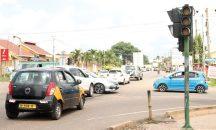Add other regions to the training for “pre-hospital emergency care”
Pre-hospital emergency care is essential for enhancing the health of patients with both acute and chronic illnesses, as well as in the event of an emergency accident.
Therefore, enabling medical staff to respond quickly to patients in urgent situations can help save lives before they are sent to the hospital for additional care.
Pre-hospital care refers to situations where the sick, injured, or critically ill patient receives first aid before being transported to a medical facility.
Sometimes the situation is so serious that quick action is required to save the injured person’s life before even an ambulance arrives, since any delay will have an adverse effect on the patient.
It is heartwarming that a Non-Governmental Organisation (NGO), Elijeko Foundation, has organised a training workshop on pre-hospital emergency care and cardiovascular diseases in the Ashanti Region in partnership with the National Ambulance Service (NAS) to assist healthcare professionals in managing emergencies like cardiac arrest before the victim is taken to the hospital.
The Foundation’s founder, Mr. Andrews Nyantakyi, explained that the programme was set up to save lives that were frequently lost due to cardiac arrest because bystanders were unable to administer life-saving resuscitation in a timely manner.
“We hope to use this programme to create a platform to promote direct community engagement and equip Ghanaians with the knowledge of what, when and how to respond to emergencies,” he explained.
The Spectator applauds the NGO’s initiative and hopes that the training would be made available to the general public and other regions of Ghana, to better prepare people to manage emergency situations and save lives.
This is due to the fact that families are frequently so bewildered during emergencies that they are unable to control the situation in a way that would save a life or instantly consider which hospital to transport the ill person to.
The problem is made worse when there isn’t enough transportation to take a patient to the hospital right away.
People end up dying as a result of this, which could have been prevented if a home cure for first aid had been used.
In an emergency, whether at home or in a public setting, one must act immediately to stabilise a patient who is in critical condition.
The majority of the time, a life has already been lost by the time the patient is taken to the hospital since a medical professional may not have arrived in time to provide first aid.
The Spectator calls on the government to intervene by giving the necessary resources, particularly money, to support the work of the NAS and the NGO to extend the training to other healthcare organisations and even private citizens.
We also hope that the government will heed the plea of Dr Joseph Bonney, an Emergency Medicine Specialist at the Komfo Anokye Teaching Hospital at Kumasi in the Ashanti Region to “enact a law for every public facility to have a first aid box and automated external defibrillator.”
Let us work to lead healthy lifestyles by keeping an eye on our diets, getting regular exercise, being socially engaged, visiting a doctor for routine exams, taking our medications as prescribed, getting enough sleep, avoiding excessive alcohol consumption, and quitting smoking.
Additionally, you should get medical help right away if you see any symptoms of a chronic disease to prevent any emergencies.













